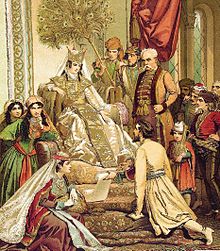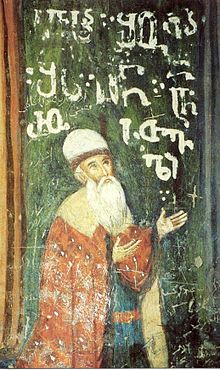Shota Rustaveli


Shota Rustaveli ( Georgian შოთა რუსთაველი ; * around 1172 in Rustavi , Georgia ; † around 1216 in Jerusalem ) was a Georgian poet and one of the most important literary figures of the Middle Ages . He wrote the courtly epic The Warrior in a Tiger Skin or "The Knight in a Tiger Skin " (Georgian Vepkhis t'q'aosani , meaning the one who wears a tiger skin). The accompanying manuscript was declared World Document Heritage in 2013 .
Life
Rustaveli is said to have lost both parents as a child and grew up with an uncle who was a monk . He was a Georgian prince and finance minister to Queen Tamar of Georgia. His surname means either "owner of the Rustavi property" or "coming from Rustavi".
Few details are known about his life. His birth and death dates are unknown. He studied Greek , took part in the campaigns of his queen, later lived in Jerusalem and had the columns in the Georgian Cross Monastery renovated there. In addition to his state office, he also worked as a philosopher and astrologer .
His poetry reflects Chinese , Persian, and Greek philosophy . Plato , King David and Mohammed are mentioned by name in the epic.
Between 1196 and 1207 Rustaveli wrote the epic The Warrior in a Tiger Skin on a royal commission . It depicts chivalry and generosity that rise above religion and nation. Queen Tamar was enthusiastic about the work and rewarded the author generously. It became part of Georgian folk poetry and passed down from generation to generation in writing and orally for centuries .
It is not exactly known whether the protagonist's clothing (fur) is that of a tiger, panther or pardel, because it is no longer possible to check what Rustaveli and his fellow citizens called "wepchi" or "vepkhi" at the time " Roger that.
It is said that Rustaveli was a lover of Queen Tamar and is said to have been exiled in Jerusalem when she married David Soslan. He was buried under a pillar in the church of the Jerusalem Cross Monastery. The monastery contains a contemporary fresco that shows two saints as well as a figure who is believed to be Rustaveli. The fresco was badly damaged several times by vandalism in July 2004.
Georgia's President awards the Shota Rustaveli State Prize as the highest state award in the fields of literature, art and architecture . It is endowed with 8,000 Georgian lari . The largest boulevard in Tbilisi is Rustawelis Gamsiri with the metro station of the same name . There is the State Academic Theater Shota Rustaveli , the Shota Rustaveli State University in Batumi and the Shota Rustaveli Institute of Georgian Literature of the Georgian Academy of Sciences . His portrait is depicted on the front of the Georgian 100 lari banknote. A 4,860 m high peak in the Greater Caucasus and the asteroid (1171) Rusthawelia were named after the poet .
literature
Editions of the epic are given in the article The Warrior in a Tiger Skin
- 800 [eight hundred] years Schotha Rusthaweli: Georgian poet . Memorial exhibition in the State and University Library Hamburg 1966, Georgischer Verlag Sakharthwelo, Itzehoe 1966
- Giorgi Arabuli: Šot'a Rust'velis biograp'ia k'art'ul mec'nierebaši [ The biography of Shota Rustaveli in Georgian science ]. Merani, Tbilisi 1992
- Steffi Chotiwari-Jünger: Rust´aveli, Šot´a (Rustaweli, Schota) . In: Gero von Wilpert: Lexicon of world literature . Alfred Kröner Verlag, Stuttgart 2004
- Mariam Lordkipanidze: Georgia in the XI - XII centuries , translated from Russian by David Skvirsky, Ganatleba, Tbilisi 1987
Rustaveli's only surviving work has appeared in German in various editions: as an epic, as a retelling, as a children's book, as a retelling of the retelling, mostly without knowledge of Georgian, with interlinear translation or through Russian.
The reproductions closest to the original belong to Hugo Huppert and Marie Prittwitz (dates from the 1940s and was not rediscovered until 2005).
Rusthaweli, Schota: Der Recke im Tigerfell, Berlin 1955, 1970, 1980, 1982, Wiesbaden 2014 (T: H. Huppert) ISBN 978-3-9549-0045-9 Rustaweli, Schota: Der Ritter im Tigerfell, (Ed. Of Steffi Chotiwari-Jünger and Elgudsha Chintibidse), Tbilissi-Berlin 2005, Aachen 2011 (t: M. Prittwitz). ISBN 978-3-8440-0300-0
The first translation / translation into German was made by Arthur Leist. Rustaweli, Schota: The man in the tiger skin, Leipzig 1889, 1890, 1891, 1903
The most detailed retelling appeared in Switzerland / From the Georgian by Ruth Neukomm /: Rustaweli, Schota: Der Mann im Pantherfell, Zurich 1974, Tbilissi 1976, 1991
Others: Rustaveli, Schota: The hero in the leopard skin. Retold for children. Berlin 2018 Rustaweli, Schota: The warrior in a tiger skin, for children, Berlin 1976, 1979, 1988, 1991 Rustaweli, Schota: The warrior in a tiger skin, Berlin / Neckenmarkt 2014 Rustaweli, Schota: The knight in a tiger skin (literal translation from Georgian) , Paris 1975; Aachen 2010 Rusthaweli, Schota: Aphorismen, Tbilissi 1970, 1974, 1991 Rusthaweli, Schota: The warrior in a tiger skin, for children, Reutlingen 1931 Rusthweli, Schotha: The knight in a panther skin, Tbilisi 2015
Web links
- Literature by and about Schota Rustaweli in the catalog of the German National Library
Individual evidence
- ↑ Manuscript Collection of Shota Rustaveli's poem "Knight in the Panther's Skin". In: Memory of the World - Register. UNESCO , 2013, accessed June 20, 2013 .
| personal data | |
|---|---|
| SURNAME | Rustaveli, Shota |
| ALTERNATIVE NAMES | შოთა რუსთაველი (Georgian) |
| BRIEF DESCRIPTION | Georgian writer and finance minister |
| DATE OF BIRTH | around 1172 |
| PLACE OF BIRTH | Rustavi |
| DATE OF DEATH | around 1216 |
| Place of death | Jerusalem |
